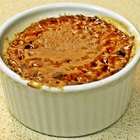GROGL/iStock/GettyImages
Billowing, lightly browned meringue looks beautiful atop a lemon pie, but its taste can sometimes disappoint. Meringue is a quick, inexpensive and versatile topping, but it can be temperamental – becoming watery or bland. Fortunately, almost any sweet, white topping can stand in for meringue.
Whipped Cream Icing
Whipped cream makes a light, fluffy substitute for meringue, but it quickly loses its volume and becomes watery unless stabilized with gelatin. Soften a bit of unflavored gelatin in warm water. Stir in some warm cream to temper the gelatin and keep it from clumping. Whip heavy cream until soft peaks form. Add the gelatin mixture and any sweeteners and flavorings, and whip to stiff peaks. Whipping cream made this way can be spread as a smooth frosting or piped onto pies and cakes. Use it to fill eclairs and profiteroles too. Stabilized whipped cream will remain solid for up to three days. Refrigerate any leftovers promptly.
Seven-Minute Heaven
For a sweet, fluffy cake icing, make old-fashioned seven-minute boiled frosting instead of meringue. This frosting resembles marshmallow cream, and it's at its best while still warm. Combine water, sugar, salt and cream of tartar in a saucepan and bring to a boil. Whisk some egg whites in a bowl, just until they're light and fluffy, not stiff. Slowly add the heated sugar mixture and beat. The frosting miraculously doubles in size and becomes shiny and slightly sticky. Slather it over cream pies, cakes and cupcakes and eat immediately.
Short Cuts
When you're short on time, you can use canned whipped cream or even a tub of softened whipped topping to decorate cream pies. These products don't taste as good as homemade, but they'll work in a pinch. Combine mascarpone or ricotta cheese with whipped cream to make a quick filling for eclairs and other delicate pastries.
Meringue Success
Although there are many worthy substitutes, sometimes only meringue will do. If you've avoided meringue because of the risks associated with raw eggs, you can breathe easy. Meringue recipes that call for heating the eggs to 160 degrees Fahrenheit effectively destroy any salmonella lurking in the eggs. You can also substitute pasteurized egg products or meringue powder for raw eggs. Another reason for avoiding meringue is the perception that it's temperamental and hard to make. The most common problem when making meringue is dry, lumpy egg whites, caused by overbeating. Add sugar to the egg whites, which provides moisture and helps stabilize them, and beat just until stiff peaks form. Weeping – or liquid between the meringue and pie filling – can occur if the meringue isn't cooked thoroughly. Beads of moisture on top of the meringue are caused by too much heat. To minimize both problems, bake meringue 15 minutes at 350 F until golden brown.
Related Articles

How to Fix Grainy Whipped Ganache

How to Make a White Decorator Icing

How to Make Whipped Frosting Without ...
What Do Bakeries Use in Their Whipped ...

How to Stiffen Meringue

How to Use Gelatin to Thicken Frosting

Custard vs. Pastry Cream
How Can I Prepare Whipping Cream Ahead ...

The Cream for My Tiramisu Is Too Watery
How to Keep Meringue Pie Topping From ...

How to Thicken a Lemon Filling in Baking

How to Harden Up Whipped Cream

Adding Vanilla Pudding to Whipping Cream

How to Make Creme Brulee Without a Torch

How to Mix Lemon Curd With Whipping ...

How to Thicken Cream Filling
What Causes a Cheesecake to Split When ...

How Long Can Cupcakes Be Stored After ...
Easy Homemade Chocolate Chip Cookies ...

How to Soften a Stiff Buttercream
References
- The Art & Soul of Baking; Cindy Mushet
- King Arthur Flour: Fluffy White Icing
- Woodland Bakery Blog: Stabilized Whipped Cream for Icing Cakes
- USDA: Shell Eggs From Farm to Table
Writer Bio
Julie Christensen is a food writer, caterer, and mom-chef. She's the creator of MarmaladeMom.org, dedicated to family fun and delicious food, and released a book titled "More Than Pot Roast: Fast, Fresh Slow Cooker Recipes."